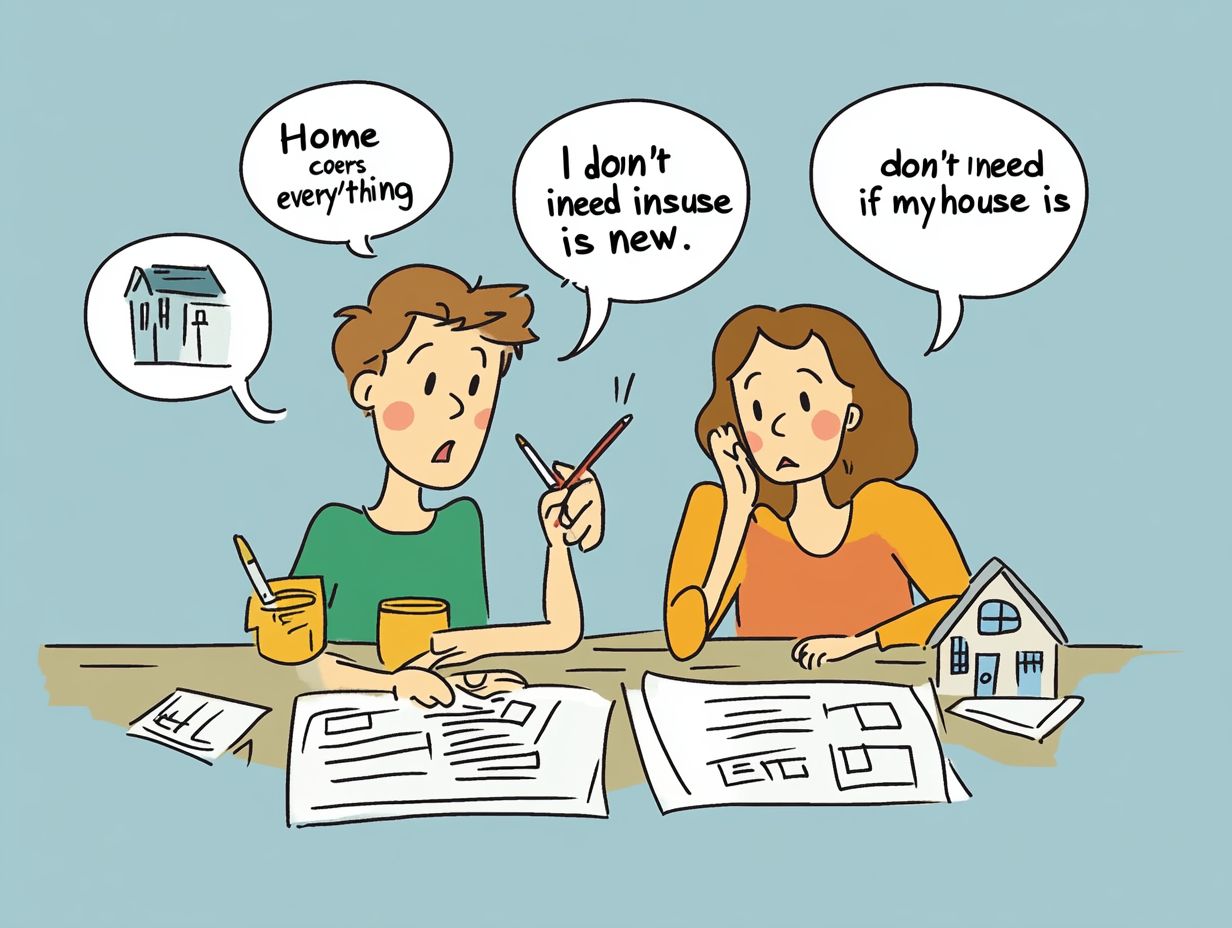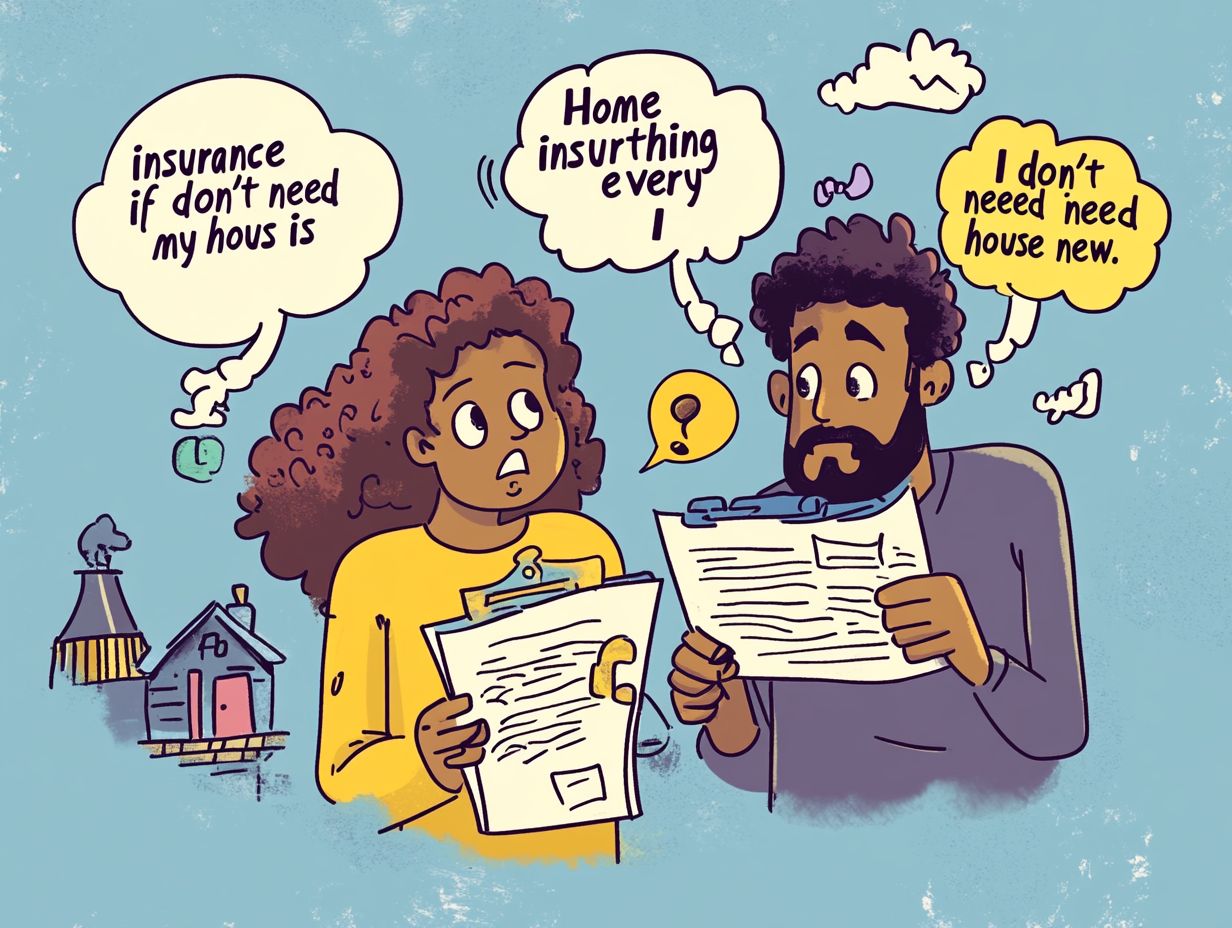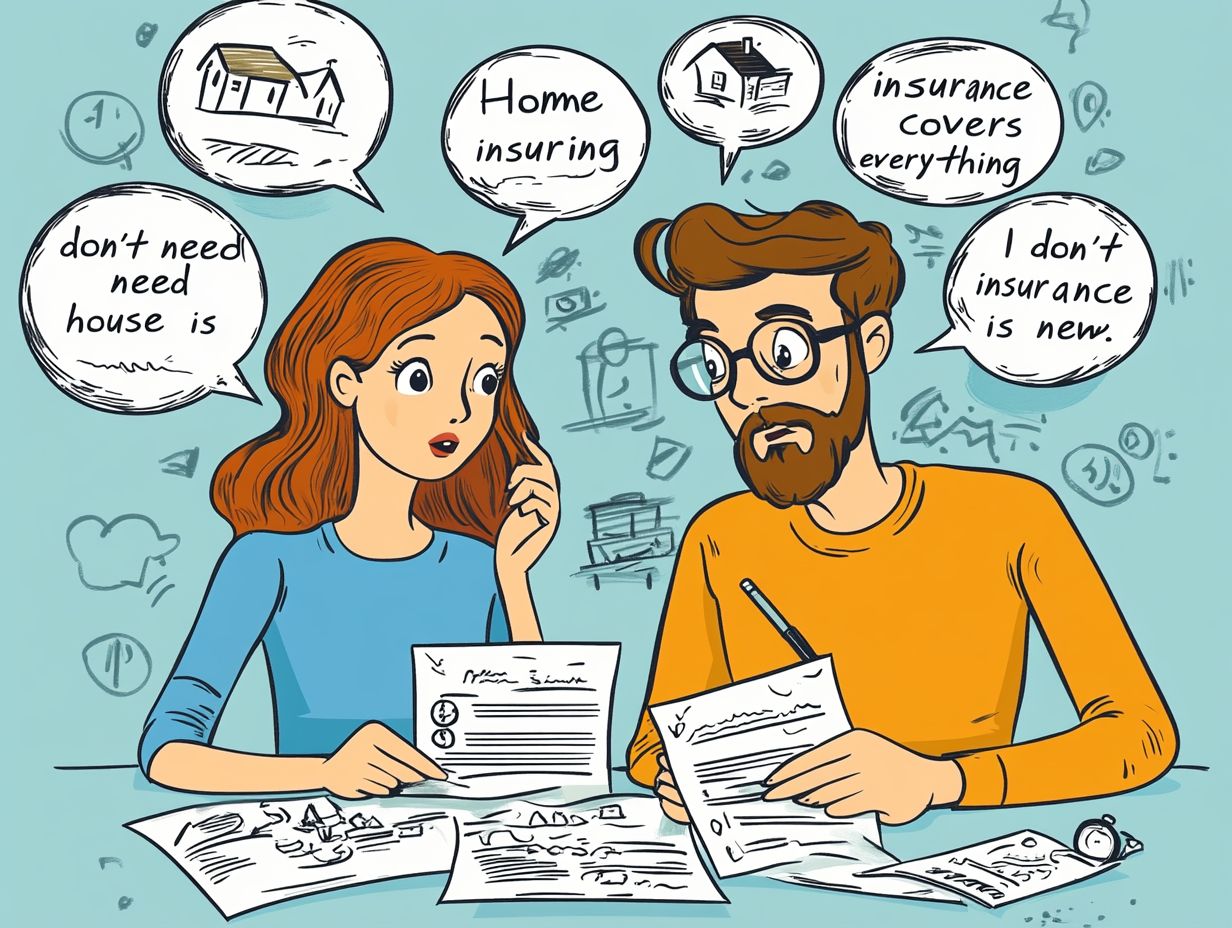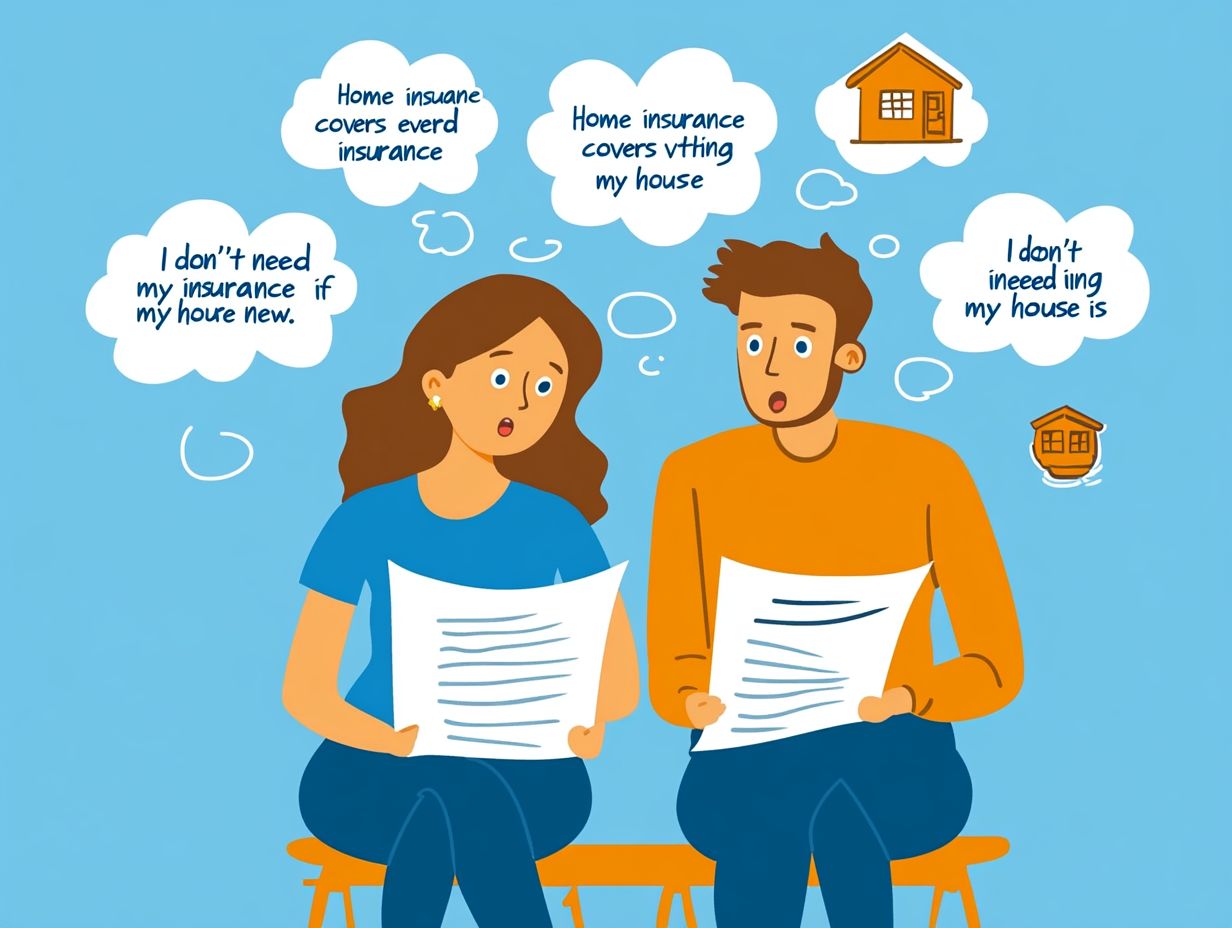8 Common Misconceptions About Home Insurance
Home insurance can feel like a maze of myths, leaving homeowners unsure of their coverage.
Whether you re a first-time buyer or a seasoned homeowner, it s vital to know the facts. This article explores eight common misconceptions about home insurance.
We’ll clarify what home insurance really covers, including your personal belongings. Get ready to better protect your investment!
Curious if you ve fallen for any of these myths? Read on!
Contents
- Key Takeaways:
- 1. Home Insurance Is Only for Homeowners
- 2. Home Insurance Covers All Types of Natural Disasters
- 3. Home Insurance Is Expensive
- 4. Homeowner’s Insurance Is Not Necessary If You Have a Low-Value Home
- 5. Homeowner’s Insurance Covers All Personal Belongings
- 6. Homeowner’s Insurance Covers Damage Caused by Negligence
- 7. Homeowner’s Insurance Will Automatically Cover Home-Based Businesses
- 8. Home Insurance Is Not a One-Time Purchase
- What Does Home Insurance Actually Cover?
- What Factors Affect the Cost of Home Insurance?
- How Can Homeowners Save on Home Insurance?
- What Are the Different Types of Home Insurance?
- What Is the Process for Filing a Home Insurance Claim?
- What Are the Most Common Exclusions in Home Insurance Policies?
- How Can Homeowners Determine the Right Amount of Coverage?
- What Are the Consequences of Not Having Home Insurance?
- Preguntas Frecuentes
- Did you know there are common misconceptions about homeowners insurance?
- Does homeowners insurance only cover the structure of the house?
- Is homeowners insurance only necessary for homeowners?
- Is homeowners insurance very expensive?
- Does homeowners insurance cover natural disasters?
- Does homeowners insurance cover all personal belongings?
- Is it legally required to have homeowners insurance?
Key Takeaways:

Home insurance isn t just for homeowners; it also covers renters and condo owners. It doesn t cover all natural disasters, so check your policy for specific coverage details. Home insurance can be affordable, and there are ways to save on premiums.
1. Home Insurance Is Only for Homeowners
Many people mistakenly think homeowners insurance is just for property owners. However, renters insurance is equally important, offering financial protection for anyone living in a home.
Understanding the difference between homeowners and renters insurance is crucial. Homeowners insurance covers the house structure, personal belongings, and liability protection, while renters insurance focuses on personal property and liability in a rented space.
Insurance agents help bridge the knowledge gap, guiding you through your specific needs and coverage options. They ensure both homeowners and renters have the necessary protection.
2. Home Insurance Covers All Types of Natural Disasters
Many believe that home insurance covers every natural disaster. In reality, events like floods and earthquakes need special policies, so it’s important to learn how to avoid common home insurance pitfalls, as these aren’t typically included in standard homeowners insurance.
Understanding these details is key, especially for those in high-risk areas. Believing your home insurance covers every disaster can lead to surprises when filing a claim, so it’s important to be aware of key facts about home insurance coverage.
Flooding often comes from outside water, while earthquake damage is due to ground movement. Each situation requires different coverage.
Homeowners should review their policies carefully to know the limits and exclusions. Consider additional protection to safeguard against nature’s unpredictable forces.
3. Home Insurance Is Expensive
You might think home insurance is too costly, but several factors influence your premiums. Your location, coverage options, and deductible amounts all play a role in determining affordability.
Areas prone to natural disasters typically have higher rates. Also, the type of coverage you choose basic or comprehensive affects costs.
Choosing higher deductibles can lower your premiums. Maintaining a clean claims history and adding security features can also help you secure better rates.
With these strategies, you can protect your home without straining your finances.
4. Homeowner’s Insurance Is Not Necessary If You Have a Low-Value Home
Many people believe that homeowner’s insurance isn’t worth it for low-value homes. This viewpoint overlooks the critical financial protection it provides against property damage, liability claims, and unforeseen events. Understanding what every homeowner should know about insurance can help prevent hefty out-of-pocket expenses.
Even in homes with modest market values, risks like theft, fire, or natural disasters are very real. It s easy to underestimate how quickly these incidents can escalate into costly repairs or replacements, especially with today s sky-high material and labor costs.
Without adequate coverage, you might grapple with a financial burden that disrupts your daily life. Homeowner’s insurance protects against immediate threats and offers peace of mind, allowing you to live without the constant worry of unexpected incidents that could jeopardize your financial stability.
5. Homeowner’s Insurance Covers All Personal Belongings
A common misconception is that homeowner’s insurance automatically covers all personal belongings. In reality, most policies set specific limits for high-value items, making it essential to fully grasp your personal property coverage and consider important questions before buying home insurance to take a detailed inventory of your possessions.
For example, items like jewelry, fine art, and collectibles often need special consideration. Standard coverage may not reflect their true value in the event of a loss. To safeguard your cherished possessions, review your insurance policy and explore additional coverage options for high-value items.
Conducting a comprehensive home inventory helps you identify what requires extra protection and streamlines claims processing if needed. Understanding these nuances ensures that your valuable belongings receive the protection they deserve.
6. Homeowner’s Insurance Covers Damage Caused by Negligence

Many homeowners assume that their insurance covers all types of damage, including those stemming from negligence. However, homeowner’s insurance typically doesn’t cover damages resulting from negligent or intentional acts, emphasizing the importance of understanding liability coverage.
This misunderstanding can lead to significant financial repercussions when unexpected incidents arise. For instance, if you neglect proper maintenance of your property and a guest slips on an icy walkway, the injury might go uncovered as it could be classified as negligence.
Damages from reckless actions, like hosting a wild party, may also lead to denied claims. Property owners should know their policies, ensuring they understand specific liabilities and exclusions that could affect their coverage when they need it most.
7. Homeowner’s Insurance Will Automatically Cover Home-Based Businesses
There s a misconception that homeowner’s insurance conveniently covers home-based businesses. In reality, most standard homeowner’s policies lack business liability coverage. You might need to explore additional insurance options specifically designed for business owners.
If you run a home-based business, grasping the nuances of insurance requirements is crucial. Assess the unique risks associated with your operations, such as liability from client visits or potential product-related issues.
Business interruption insurance also deserves your attention, as it safeguards your income if operations are unexpectedly disrupted by events like natural disasters. Consider commercial property coverage or professional liability insurance.
Don t wait to consult with an insurance agent! They can provide tailored advice, ensuring your specific business needs are comprehensively addressed, so you can operate with confidence and peace of mind.
8. Home Insurance Is Not a One-Time Purchase
Many individuals mistakenly believe that homeowners insurance is a one-and-done purchase. It’s essential to review and update your policy regularly, as there are myths about home insurance that can mislead you regarding its value. Keeping your coverage aligned with changes in valuation, options, and your home maintenance needs is crucial.
Life is ever-changing. As your circumstances evolve whether due to renovations, acquiring new belongings, or emerging risks in your neighborhood you must review your insurance premiums and coverage.
Regularly reviewing your policy guarantees that you are adequately protected against potential losses and that you re not overpaying for coverage that no longer fits your needs. Actively reviewing your policy protects your personal assets and can save you money!
What Does Home Insurance Actually Cover?
Homeowners insurance is a comprehensive policy crafted to provide you with financial protection against various risks, including property damage, theft, and liability. Understanding what s covered in your homeowners insurance policy is essential for maximizing your benefits.
By breaking down the main components, you can grasp the key aspects of this insurance. Typically, your policy includes:
- Protect your home with dwelling coverage against fire and storm damage.
- Safeguard your belongings with personal property coverage.
- Shield yourself with liability coverage for injuries on your property.
- Maintain your living conditions with additional living expenses coverage.
For instance, a kitchen fire not only damages your home but your insurance can cover repairs and living costs during that time. Taking the time to thoroughly read and understand the terms of your policy will empower you to navigate potential scenarios with confidence.
What Factors Affect the Cost of Home Insurance?
Several factors influence the cost of your homeowners insurance, including the deductible amount, policy limits, location, and the age of your home. Each of these elements plays a crucial role in determining your insurance premiums and the level of financial protection you enjoy.
Your neighborhood can have a significant impact on your rates. If you live in an area prone to natural disasters or high crime, you might notice higher premiums reflecting that risk. The condition of your property also matters; aspects like the roof, plumbing, and electrical systems can either inflate or reduce your costs based on their age and maintenance.
For instance, older homes often carry extra costs due to an increased likelihood of claims. Your personal claims history is another pivotal factor. If you have a history of frequent claims, insurers may see you as a higher risk, leading to increased premiums.
However, there s good news: you can easily take steps to lower your costs. By increasing your deductibles, enhancing your home security, or participating in loss prevention programs, you demonstrate responsible management that could lead to potential discounts.
How Can Homeowners Save on Home Insurance?
Homeowners seeking to reduce their insurance premiums can employ a variety of effective strategies. Consider increasing your deductible amount, maintaining a detailed home inventory, and regularly updating your insurance policy to reflect any improvements or repairs made to your property.
Bundling multiple insurance policies, such as home and auto, can be particularly advantageous. Many companies offer substantial discounts for this approach, allowing you to save significantly.
Investing in home enhancements, like installing security systems or upgrading to impact-resistant roofs, can also lead to lower premium rates. Not only do these improvements safeguard your property, but they may also qualify you for various discounts.
Talk to an insurance agent for personalized advice. They can help you uncover the best options to maximize your savings without compromising your coverage.
What Are the Different Types of Home Insurance?

Understanding the various types of home insurance is essential for you. Different policies such as homeowners insurance, renters insurance, flood insurance, and earthquake insurance are designed to meet specific needs and risks associated with residential properties.
Homeowners insurance typically provides complete coverage for your dwelling and belongings. It also includes liability protection if someone is injured on your property.
If you re renting, renters insurance covers your personal items against theft or damage, although it won t protect the physical structure itself.
If you live in an area with heavy rainfall or rising waters, flood insurance is crucial. It safeguards you against water damage that standard policies usually don t cover.
Similarly, earthquake insurance is vital if you reside in a seismically active region. It fills in coverage gaps that could arise from natural disasters.
Selecting the right policy requires careful consideration of your circumstances. Make sure you secure adequate protection tailored to your specific risks.
What Is the Process for Filing a Home Insurance Claim?
Filing a home insurance claim is important for homeowners facing damage or loss. Understanding the necessary steps can lead to a smoother claims experience.
This process begins with taking clear photographs and noting the damage. These serve as crucial evidence for your claim.
Once you’ve gathered this documentation, contact your insurance company to report the incident. Provide a detailed account of the situation while having your documentation ready.
It’s essential to review your policy’s deductible amounts. These can significantly influence the final payout.
To maximize your chances of a successful claim, keep open communication with your insurer and regularly follow up on your claim s progress.
What Are the Most Common Exclusions in Home Insurance Policies?
Homeowners insurance policies often come with common exclusions that can leave you vulnerable to unexpected expenses. For instance, damage from floods, earthquakes, or negligence is often not covered, making it crucial to understand common home insurance myths.
These exclusions can create significant gaps in your protection, catching you off guard when disaster strikes. Standard policies may not cover certain natural disasters, leading to costly out-of-pocket repairs.
Neglecting routine maintenance can void protection for specific damages, adding another layer of complexity.
As a homeowner, it’s smart to explore extra policies that can protect you from specific risks. Understanding the details of your insurance policy helps you avoid financial pitfalls, including common mistakes when filing home insurance claims.
How Can Homeowners Determine the Right Amount of Coverage?
Determining the right amount of homeowners insurance coverage requires careful consideration of factors like replacement cost, personal belongings, and policy limits.
Engaging an insurance agent can be invaluable in tailoring your coverage. Start by estimating the replacement cost of your home, considering fluctuating material and labor costs.
You should quickly conduct a thorough inspection of your home. Pay attention to unique features that could impact its value.
Maintaining a detailed inventory of your personal items is crucial. This ensures you have adequate coverage and simplifies the claims process should the unexpected occur.
Collaborating with insurance professionals can provide you with personalized recommendations. This helps ensure your specific requirements are met while navigating policy options.
What Are the Consequences of Not Having Home Insurance?
Choosing to forgo homeowners insurance can lead to severe consequences. You expose yourself to significant financial loss due to property damage and claims from accidents.
This reality underscores the necessity of having robust financial protection. Without this essential safety net, you risk facing overwhelming expenses that can arise from unforeseen events like natural disasters.
Picture this: a tree crashes onto your house during a storm, causing extensive damage. Without insurance coverage, you’d be responsible for repair costs that could soar into the thousands, jeopardizing your financial stability.
Now, consider this scenario: if a guest slips and falls on your property and files a lawsuit, you could find yourself managing medical bills and potential legal fees. In these situations, lacking homeowners insurance can turn manageable setbacks into devastating financial crises.
Preguntas Frecuentes
Did you know there are common misconceptions about homeowners insurance?

Some common misconceptions about homeowners insurance include that it only covers the structure of the house, is only necessary for homeowners, is very expensive, covers natural disasters, covers all personal belongings, and is a legal requirement. To clarify these points, check out the article on common myths about home insurance debunked.
Does homeowners insurance only cover the structure of the house?
No, homeowners insurance also covers other structures on your property, like garages and fences. It includes personal liability, medical expenses, and additional living expenses in case of a covered loss.
Is homeowners insurance only necessary for homeowners?
No, it is also necessary for tenants. While it may not cover the structure, it protects your personal belongings and offers liability coverage for accidents.
Is homeowners insurance very expensive?
The cost varies based on location, coverage type, and deductible. However, it is essential to protect your home and belongings against unexpected events.
Does homeowners insurance cover natural disasters?
While it may cover some natural disasters, it does not cover all. Review your policy and consider additional coverage for specific disasters common in your area.
Does homeowners insurance cover all personal belongings?
No, it generally has coverage limits for certain belongings, such as jewelry and collectibles. Check your policy for details and consider additional coverage for valuable items.
Is it legally required to have homeowners insurance?
Homeowners insurance is not required by law, but it may be a requirement from your mortgage lender. Even if not mandatory, it is highly recommended to protect your home and belongings from unexpected events.



